Our emotions are as complicated as we are. Grief is a very personal emotion and we all experience it differently. Our pain, intensity and perspective will be as different as our reason for grieving. Understanding the different models of grief can help us cope better with our pain.
Coping with loss may leave us feeling pregnant with a jumbled mess of mixed emotions as we make our way through the different stages of grief in our own unique way.
Grief, loss and bereavement often leaves us with a lot of confusion and questions.
Is this how I am supposed to feel?
Should I have done something more?
Am I mourning enough?
Should I be smiling right now?
Why am I feeling differently from others?
Can I ever get over this?
Should I ever get over this?
How should I feel right now?
As the anger, regret, guilt, shame, sadness and numbness pile up, we start feeling heavier and even more lost. Regardless of how intensely you grieve, know that it is all normal. Learning about the the grief process and the models of grief is the key to recovery.
Grief is an overwhelming emotion
Although it can be powerful, grief is a natural feeling. Grief can be caused by a lot of situations like separation, terminal illness, a sudden drastic change, relationships, substance abuse and more. However, losing a loved one is perhaps the most devastating experience in life.
Grief can leave us feeling numb, sad and even paralyzed as we try to live through the burden of our daily lives. The crippling weight of grief crushes our mind, heart and soul as we try to live another day.
Sadly, our modern society does not allow us enough time & space to deal with such complicated and heavy emotions as we are thrown right back into life, compelled to live and be ‘normal’.
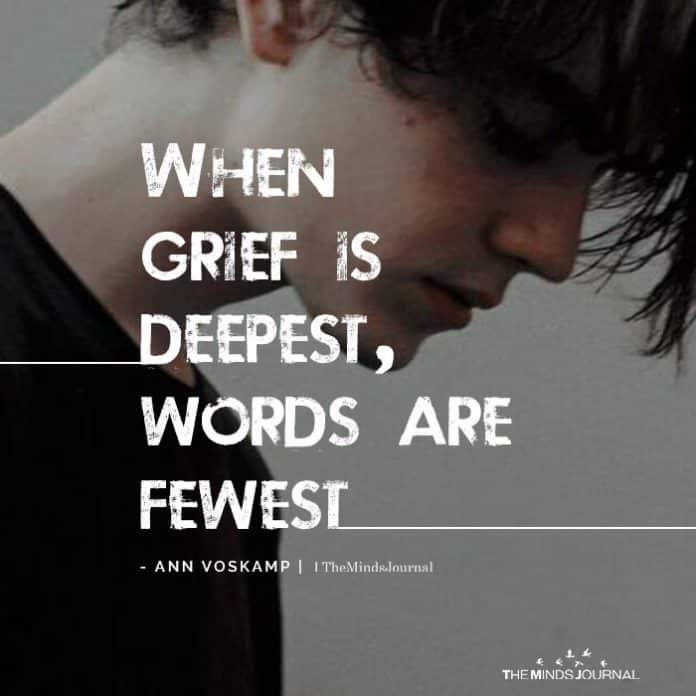
Grief is a universal experience which is immensely personal. The more you try to suppress and repress your emotions, the angrier and more isolated you will feel.
Hence, it is crucial that you learn about the different stages and models of grief and understand the different aspects of grief to recover from it while acknowledging your emotions.
6 Different models of grief
Grief has been studied by numerous psychologists and experts over the years and a number of helpful models were developed to understand the experience more deeply.
These models of grief can guide us to better understand the processes and emotions related to this natural human experience. However, these models should only be referred to as a general rule of thumb as everyone experiences grief in their own personal way.
In this article, we are going take a quick look at the following popular models of grief:
- The Five Stages of Grief by Dr. Elisabeth Kübler-Ross and David Kessler
- Rando’s Six R Processes of Mourning/Recovery by Dr. Therese Rando
- The Four Phases of Grief by Dr. John Bowlby and Dr. Colin Murray Parkes
- Model of Loss/Adaptation by Mardi Horowitz, M.D.
- The Four Tasks of Mourning by Dr. J. William Worden
- Dual Process Model of Grief by Margaret Stroebe and Henk Schut
It is important to remember that none of these models of grief are perfect and all of them have their own strengths and weaknesses. You can’t find any decisive model which will be applicable to every grieving individual.
Read 14 Ways To Break Up Better and Minimize The Pain
Here are the 6 most popular models of grief:
1. Elisabeth Kübler-Ross & David Kessler’ Five Stages of Grief
Although originally developed for a terminally ill person accepting their impending death, the Kübler-Ross model is now widely applied to tragedy and grief as well.
Being one of the most popular models of grief, the Kübler-Ross model of grief proposes that an individual experiencing grief will go through 5 different stages, namely denial, anger, bargaining, depression, acceptance – in no specific order.
1.1. Denial
It is regarded as the first of the 5 stages and may manifest through shock, rejection and disapproval of the tragedy being experienced. You may feel extreme sadness and numbness. Denial helps to accept loss and pacify the initial and sudden attack of pain.
1.2. Anger
During this chaotic period, anger can often provide the strength when you don’t feel like you want to carry on. While grieving, you may feel aimless and your anger may manifest at the most unexpected situations. This is a natural stage of the process and it is important to feel and acknowledge all your emotions including anger.
1.3. Bargaining
You may try to bargain in order to cope with the loss and protect the life you lived before the tragic event. You may find yourself trying to bargain with God or a divine power, if you are spiritual, or even with your own self. Bargaining is a coping mechanism and a normal response.
1.4. Depression
Depression can be common when trying to cope with the loss of a loved one. Although not necessarily a sign of mental illness, you may feel a deep sadness, you may lose all hope and feel lonely, isolated and withdrawn. This is also a natural response for loss and grief.
1.5. Acceptance
Acceptance doesn’t mean getting back to your life like it was and being ‘okay’ with loss. Acceptance is learning to willingly live again even though you’re heartbroken and feel empty in life. It is not about replacing what we have lost but about picking up the pieces and moving ahead while carrying them in our hearts and minds.
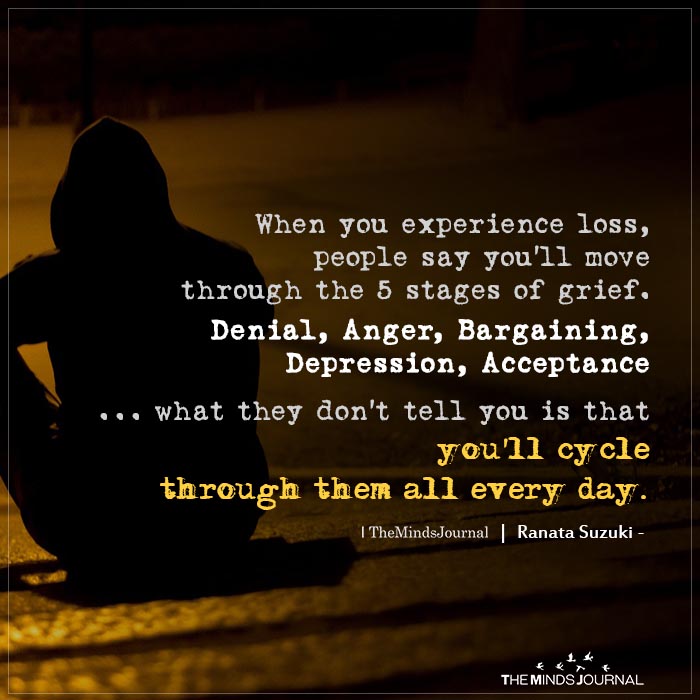
2. Dr. Therese Rando’s Six R Processes of Mourning
This is also one of the most popular models of grief. Dr. Rando believes grief is different from mourning. Grief is an unintentional emotional response to a loss while mourning is a systematic process of working through grief.
She claims that avoidance, confrontation, and accommodation are the three phases of mourning that one must work through. Rando’s stages of grief model enables you to begin your healing journey and live your life in a meaningful way once again.
Before we delve into the 6 R processes to work through grief, let us take a glance at the 3 phases of mourning:
- Avoidance Phase
- Confrontation Phase
- Accommodation Phase
Dr. Rando’s six R’s processes of recovery include the following:
2.1. Recognizing the loss
Instead of living in denial and ignoring the reality, it is imperative that you first understand, accept and acknowledge the loss of your loved one.
2.2. Reacting to the separation
You need to go through all the feelings associated with grief, mourning and loss. You must recognize, acknowledge, feel, accept and express your emotions in any way so that you may grieve.
2.3. Recollect and re-experience
In this stage, you need to review, reflect, and remember the deceased loved one. You also need to process any and all emotions that may linger between you and the deceased person, present before the loss.
2.4. Relinquishing old attachments
You must let go of your attachment to the future you had envisioned while your loved one was still present. It doesn’t mean that you let go of the deceased or forget them. You just let go of all the plans and hopes for the future you had imagined with them.
2.5. Readjusting
Readjustment will enable you to begin the journey forward and start building a new life while including elements of the old. Form a new relationship with your deceased loved one and gain new perspectives to build a new identity for yourself.
2.6. Reinvesting
It is the time when you step out of the pain and heaviness and start living a new life by pursuing new goals and developing new relationships while still remembering them fondly.
According to Dr. Rando, going through these 6 processes at your own pace will help you move ahead in your life.
3. Dr. John Bowlby & Dr. Colin Murray Parkes’ Four Phases of Grief
The Four Phases model by Bowlby and Parkes was derived from Bowlby’s work on attachment theory and was applied to bereavement and grief. This is also one of the most renowned of grief. This model includes the following four phases:
3.1. Shock and numbness
When we grieve losing a loved one, we often feel that loss is nearly impossible to welcome and accept. We feel that it is not our reality. If we are unable to cope with this phase properly, we might experience depression of related symptoms that will hold us from progressing to the next phases.
3.2. Yearning and searching
During this phase, you will be aware of losing your loved one. However, as you begin to realize that you have to live a future in their absence, you will start looking for ways to fill the emptiness. It is crucial that you allow yourself to create a different and a new future life where you’re not crippled by the pain of loss.
3.3. Despair and disorganization
In this stage, you have accepted the fact that your previous vision of the future will not be possible anymore and that your life will never be the same. This may lead to intense feelings of hopelessness, anxiety, anger and despair. You may also keep questioning yourself trying to process these realizations.
3.4. Reorganization and recovery
Grieving will help you to build a new life as you feel contentment and joyousness coming back to you. You will start feeling that although you will miss them forever, you can still be positive about life and form new connections and relationships. Even though the pain will never go away, the heaviness starts to disappear.
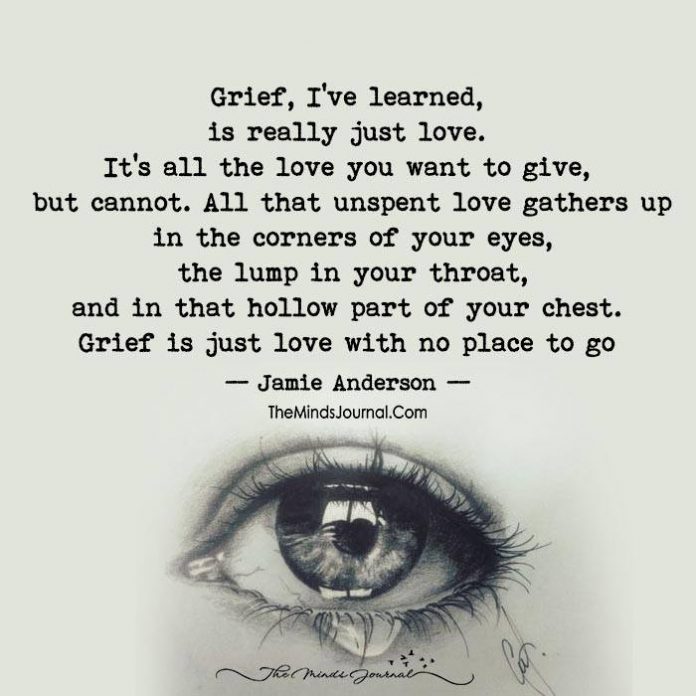
4. Mardi Horowitz’s Model of Loss/Adaptation
Mardi Horowitz developed one of the most practical models of grief which helps you better understand the different patterns, emotions and process of grief. It can be used as a helpful guide to get through the grieving process.
4.1 Outcry
The initial response of realizing that you have lost a loved one is usually an emotional outcry. You may express it outwards by publicly crying, screaming and collapsing. On the other hand, you may keep your emotions suppressed so that it doesn’t become uncontrollable.
Feelings associated with the initial outcry require a significant amount of energy to sustain & doesn’t last long.
4.2. Denial and intrusion
After the outcry, you will swing back and forth between denial & intrusion.Here, denial refers to not feeling or thinking about the loss, while intrusion refers to constantly thinking and intensely feeling the loss.
You may tend to overcompensate by becoming a workaholic or feel overwhelmed with emotions. However, if you don’t feel the intensity of the loss, then that’s okay. It is natural to rest and reconstruct yourself to manage the pain.
4.3. Working through
During this stage, you will process your feeling about the loss and start seeking and figuring out new ways to live your life with your deceased loved one. You will start to rebuild your life by making new friends, pursuing new hobbies, engaging in fulfilling activities and investing in new relationships.
4.4. Completion
The process of grieving will eventually come to an end at some point. As you will learn to live with your loss, life will begin to feel normal once again. However, that doesn’t mean you will forget about your loved one or won’t miss them.
It simply means that you will be less attached to the crippling pain and it will not mess with your daily life anymore. You may still feel a reactivation of grief, but these will be minor and temporary.
Read 5 Ways To Help Someone Who Is Dealing With Loss
5. Dr. J. William Worden’s Four Tasks of Mourning
Worden’s model is also among the highly recommended models of grief. It suggests that a grieving person must complete 4 tasks in order to form a balance with grief. These tasks are non-linear and are not time-bound. These tasks are subjective and were primarily developed to cope with the death of a loved one.
5.1. Task One: Accept the reality of loss
Acceptance is crucial for healing when dealing with loss. Taking part in certain activities, like planning for the funeral, can help you reaffirm and accept the reality of a loss.
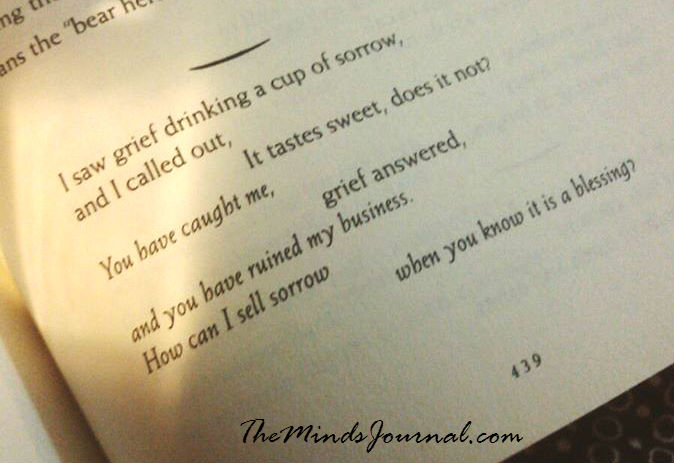
5.2. Task Two: Experience the pain and the grief
It is crucial that you express your experience of grief and pain in whatever way that might work for you. There is nothing right or wrong as long as it actually helps you to process the pain. However, it should not be used as a means to escape the reality of loss.
5.3. Task Three: Adjust to a world without them
When we lose someone we love, our entire world changes drastically. Embracing this new environment and accepting the changes can help you come to terms with losing a loved one. The sooner you start making small and simple adjustments, the easier it will be for you to reduce the impact of their absence.
5.4. Task Four: Maintain connection & reinvest in new relationships
It is crucial that you find a way to preserve the emotional connection with the deceased loved one while trying your best to build a new life for yourself. You need to move ahead and focus on living your life without letting go of the person you have lost or forgetting them.

6. Margaret Stroebe & Henk Schut’s Dual Process Model of Grief
This is one of the helpful models of grief that mainly focuses on helping you understand how someone processes and experiences grief after losing a loved one. According to this grief model, you will cycle among loss-oriented responses & restoration-oriented responses as you go through the grieving and healing process.
6.1. Loss-oriented responses
It is what we usually feel and think about when grieving the loss of a loved one. You may experience intense sadness, emptiness, loneliness, crying, mood swings, think about the deceased loved one and even become withdrawn and isolated.
6.2. Restoration-oriented responses
This occurs when you begin to accept the reality and start rebuilding your life by filling the emptiness left by the death of a loved one.
This may include activities like taking on new roles which they used to play earlier, conducting essential tasks which you never did earlier (like paying bills or doing household chores), learning to manage finances, experiencing new things and building new relationships.
You may follow the cycle repeatedly and a number of times as long as you grieve and begin the process of healing.
As we experience loss and grief in varying intensities and ways, it is best that you patiently focus on your journey towards recovery while still remembering and respecting the deceased loved one.
How to deal with loss and grief
All of us have to experience grief and loss at some point of time in our lives. It can be devastating and depressing, but by acknowledging and expressing your emotions you can start to heal, instead of getting overwhelmed with sadness.
By understanding grief and bereavement and the different models of grief, we will be better able to cope with loss, bereavement and mourning.
Here are a few ways that can help you cope with loss and minimize your pain while you mourn:
1. Participate in rituals
Make sure you take part and join in the funeral, memorial service and other traditions as it can not only help you to accept the reality, but also honor the deceased. Seeing how others love, respect and remember your loved one can be comforting.
2. Express and release your emotions
Cry if you feel like it. Crying can help you get a cathartic release which can help you cope with the loss. Whatever emotions you’re going through, know that it is natural and normal. The pain will fade over time.
3. Show compassion to yourself
Patience is key when trying to heal and recover. According to the different models of grief, it can last a lifetime but the pain doesn’t have to. It will take time to heal yourself and you will always miss them even years after they are gone. Grieving takes time. So allow yourself all the time you need and be kind and patient with yourself.
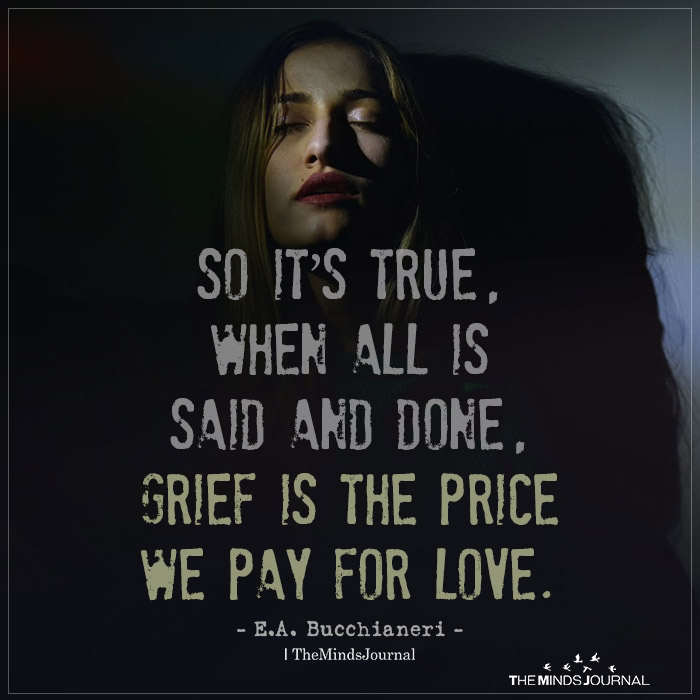
4. Talk to someone
Sit down with someone you are close with and talk about whatever you feel. Let everything out without holding anything back. However, if you don’t want to talk, you can express your emotions by writing a daily journal or a poem or anything you like as a tribute to your loved one.
5. Preserve their memories
Create a memory box or a file that contains certain reminders of them. You can put their photos, clothing items, their favorite things or anything that reminds you of them. However, make sure you don’t become a hoarder and keep everything that belonged to them.
Letting go is a crucial part of healing. The key is to bring balance back to your life while remembering them fondly. You may also plant a tree or participate in a charity run to honor their memory.
6. Self care is important
It’s easy to fall into complacency and avoid yourself when coping with heavy and suffocating emotions of grief. It’s very easy to fall victim to addictive behavior during this time. You need to be aware and maintain a healthy and positive lifestyle. Eat healthy, stay hydrated, get plenty of exercise and follow a good sleeping schedule.
7. Join a support group
Support groups can be a great help when trying to overcome grief. Support groups in your local community can help you learn new and effective coping mechanisms and gain new perspectives from people who have similar experiences.
You don’t have to go through this alone. You may also seek help from a counsellor and talk to a professional if you want to.
Find strength inside
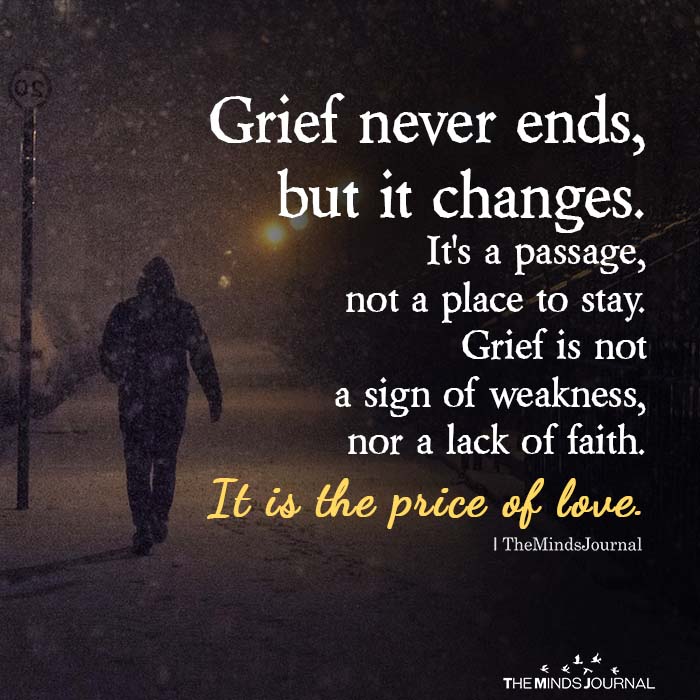
The sharp, intolerable pain of grief and loss is undoubtedly one of the worst emotions ever. Grief can come from the death of a loved one or a beloved pet, an accident, chronic illness, loss of career, end of a relationship or certain situations that change your life permanently.
However, it is imperative that you face your grief instead of trying to deny or escape it. You need to dig deep and find all the strength you can muster, but you should not give up. Ever.
The different models of grief state that you don’t need to make progress every single day. There will be days when you will feel positive while the very next day you may feel numbness. But that’s okay.
Rest and pause. Be patient and compassionate with yourself. The heavy weight of grief will be extremely crippling at times, but you can get through this.
“You will lose someone you can’t live without, and your heart will be badly broken, and the bad news is that you never completely get over the loss of your beloved. But this is also the good news. They live forever in your broken heart that doesn’t seal back up. And you come through. It’s like having a broken leg that never heals perfectly that still hurts when the weather gets cold, but you learn to dance with the limp.” – Anne Lamott
Seek professional help if you are unable to manage the pain. If your friend or family member is having a difficult time coping with grief, encourage them to seek therapy.
Frequently Asked Questions (FAQs):
How many models of grief are there?
There are 6 different models of grief developed by different experts and psychologists that can help us understand the depth of grief. However, these models serve only as guidelines as we all experience grief in our own unique way.
What is the best model of grief?
All the different models of grief have their own strengths and weaknesses and no particular model can be considered perfect or better than the other.
What is the four component model of grief?
Dr. John Bowlby & Dr. Colin Murray Parkes developed the Four Phases of Grief, which include – Shock and numbness, Yearning and searching, Despair and disorganization & Reorganization and recovery.
What are the 7 stages of grief after a death?
Psychiatrist Elisabeth Kubler-Ross’ 5 stages of grief was later expanded to 7 stages of grief after a death, which include Shock and denial, Pain and guilt, Anger and bargaining, Depression, loneliness and reflection, Change in emotions, Reconstruction, and Acceptance and hope.
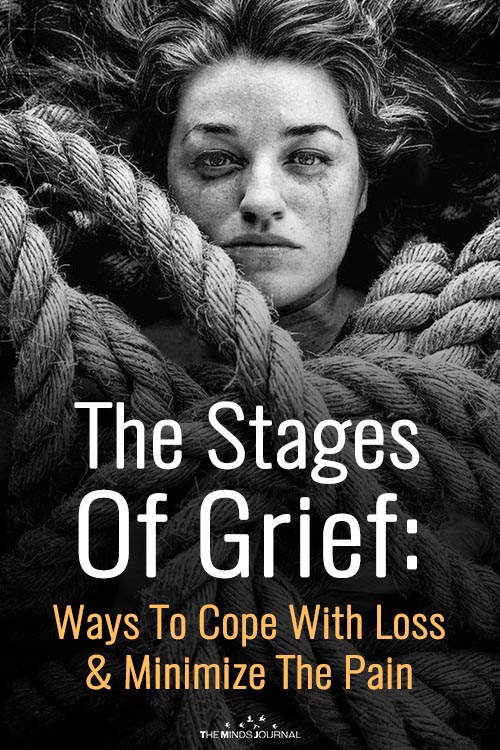
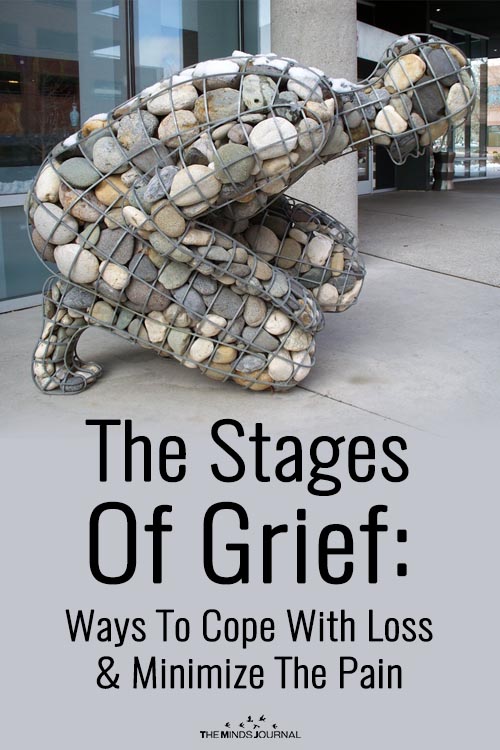
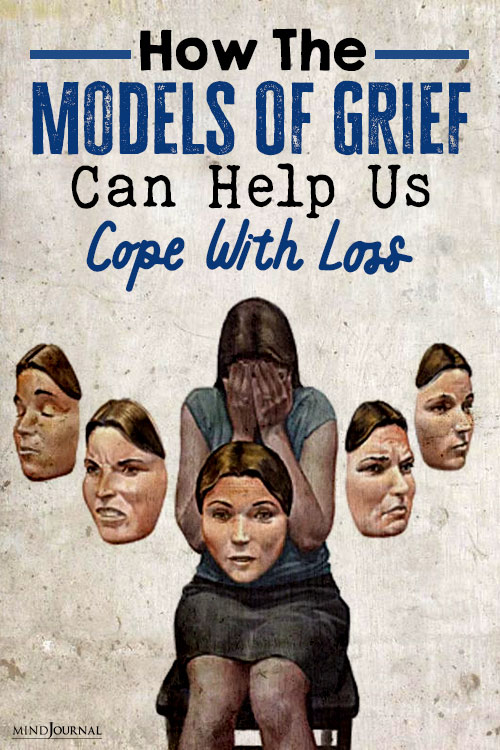


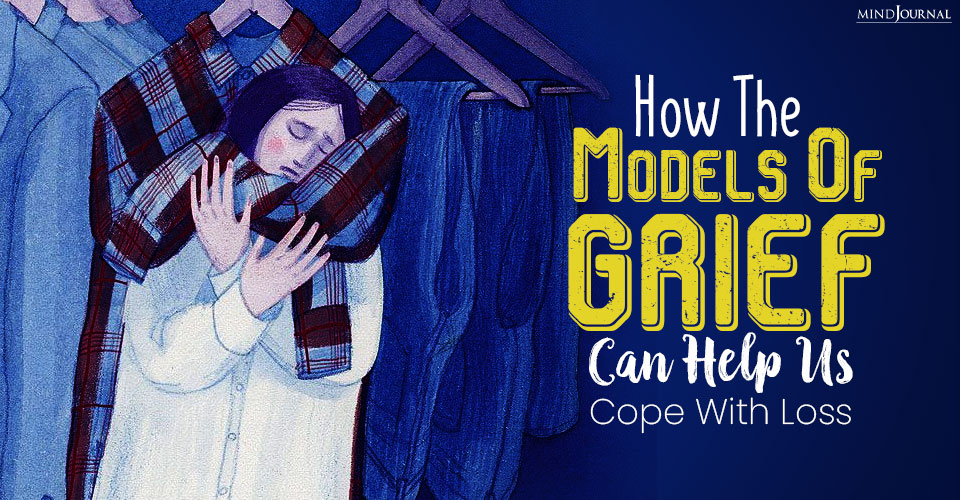







Leave a Reply